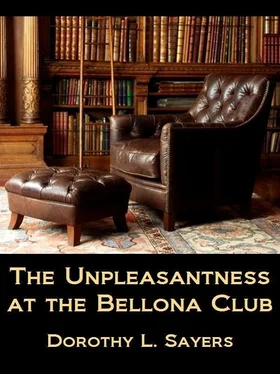“He’s not known here, Wimsey.”
“No, but he may have been here.”
“If nobody saw him, he can’t have been here.”
“Well, then, where did General Fentiman go to when he left. And when did he leave. That’s what I want to know. Dash it all, Culyer, the old boy’s a landmark. We know he came back here on the evening of the 10th — the driver brought him to the door, Rogers saw him come in and two members noticed him in the smoking room just before seven. I have a certain amount of evidence that he went into the library. And he can’t have stayed long, because he had his outdoor things with him. Somebody must have seen him leave. It’s ridiculous. The servants aren’t all blind. I don’t like to say it, Culyer, but I can’t help thinking that somebody has been bribed to hold his tongue… Of course, I knew that would annoy you, but how can you account for it? Who’s this fellow you say has been hangin’ round the kitchen?”
“I came across him one morning when I’d been down to see about the wine. By the way, there’s a case of Margaux come in which I’d like your opinion on some day. The fellow was talking to Babcock, the wine steward, and I asked him pretty sharply what he wanted. He thanked me, and said he had come from the railway to enquire after a packing-case that had gone astray, but Babcock, who is a very decent fellow, told me afterwards that he had been working the pump-handle about old Fentiman, and I gathered he had been pretty liberal with his cash. I thought you were up to your tricks again.”
“Is the fellow a sahib?”
“Good God, no. Looks like an attorney’s clerk or something. A nasty little tout.”
“Glad you told me. I shouldn’t wonder if he’s the snag I’m up against. Probably Oliver coverin’ his tracks.”
“Do you suspect this Oliver of something wrong?”
“Well — I rather think so. But I’m damned if I know quite what. I think he knows something about old Fentiman that we don’t. And of course he knows how he spent the night, and that’s what I’m after.”
“What the devil does it matter how he spent the night? He can’t have been very riotous, at his age.”
“It might throw some light on the time he arrived in the morning, mightn’t it?”
“Oh — Well, all I can say is, I hope to God you’ll hurry up and finish with it. This Club’s becoming a perfect bear-garden. I’d almost rather have the police in.”
“Keep hopin’. You may get ’em yet.”
“You don’t mean that, seriously?”
“I’m never serious. That’s what my friends dislike about me. Honestly, I’ll try and make as little row as I can. But if Oliver is sending his minions to corrupt your staff and play old Harry with my investigations, it’s going to make it damned awkward. I wish you’d let me know if the fellow turns up again. I’d like to cast my eye over him.”
“All right, I will. And do clear out now, there’s a good fellow.”
“I go,” said Wimsey, “my tail well tucked down between my legs and a flea in each ear. Oh! by the way—”
“ Well? ” (in an exasperated tone).
“When did you last see George Fentiman?”
“Not for donkey’s years. Not since it happened.”
“I thought not. Oh, and by the way—”
“ Yes? ”
“Robert Fentiman was actually staying in the Club at the time, wasn’t he?”
“Which time?”
“The time it happened, you ass.”
“Yes, he was. But he’s living at the old man’s place now.”
“I know, thanks. But I wondered whether — Where does he live when he isn’t in town?”
“Out at Richmond, I think. In rooms, or something.”
“Oh, does he? Thanks very much. Yes, I really will go. In fact, I’ve practically gone.”
He went. He never stopped going till he came to Finsbury Park. George was out, and so, of course, was Mrs. Fentiman, but the charwoman said she had heard the Captain mention he was going down to Great Portland Street. Wimsey went in pursuit. A couple of hours spent lounging round show-rooms and talking to car-demonstrators, nearly all of whom were, in one manner or another, his dear old pals, resulted in the discovery that George Fentiman was being taken on by the Walmisley-Hubbard outfit for a few weeks to show what he could do.
“Oh, he’ll do you all right,” said Wimsey, “he’s a damn fine driver. Oh, lord, yes! He’s all right.”
“He looks a bit nervy,” said the particular dear old pal attached to the Walmisley-Hubbard show. “Wants bucking up, what? That reminds me. What about a quick one?”
Wimsey submitted to a mild quick one and then wandered back to look at a new type of clutch. He spun out this interesting interview till one of the Walmisley-Hubbard “shop ’buses” came in with Fentiman at the wheel.
“Hallo!” said Wimsey, “trying her out?”
“Yes. I’ve got the hang of her all right.”
“Think you could sell her?” asked the old pal.
“Oh, yes. Soon learn to show her off. She’s a jolly decent ’bus.”
“That’s good. Well, I expect you’re about ready for a quick one. How about it, Wimsey?”
They had a quick one together. After this, the dear old pal remembered that he must buzz off because he’d promised to hunt up a customer.
“You’ll turn up to-morrow, then?” he said to George. “There’s an old bird down at Malden wants to have a trial trip. I can’t go, so you can have a shot at him. All right?”
“Perfectly.”
“Righty-ho! I’ll have the ’bus ready for you at eleven. Cheer-most-frightfully-ho! So long.”
“Little sunbeam about the house, isn’t he?” said Wimsey.”
“Rather. Have another?”
“I was thinking, how about lunch? Come along with me if you have nothing better to do.”
George accepted and put forward the names of one or two restaurants.
“No,” said Wimsey, “I’ve got a fancy to go to Gatti’s to-day, if you don’t mind.”
“Not at all, that will do splendidly. I’ve seen Murbles, by the bye, and he’s prepared to deal with the MacStewart man. He thinks he can hold him off till it’s all settled up — if it ever is settled.”
“That’s good,” said Wimsey, rather absently.
“And I’m damned glad about this chance of a job,” went on George. “If it turns out any good, it’ll make things a lot easier — in more than one way.”
Wimsey said heartily that he was sure that it would and then relapsed into a silence unusual with him, which lasted all the way to the Strand.
At Gatti’s he left George in a corner while he went to have a chat with the head-waiter, emerging from the interview with a puzzled expression which aroused even George’s curiosity, full as he was of his own concerns.
“What’s up? Isn’t there anything you can bear to eat?”
“It’s all right. I was just wondering whether to have moules marinières or not.”
“Good idea.”
Wimsey’s face cleared, and for some time they absorbed mussels from the shell with speechless, though not altogether silent, satisfaction.
“By the way,” said Wimsey, suddenly. “you never told me that you had seen your grandfather the afternoon before he died.”
George flushed. He was struggling with a particularly elastic mussel, firmly rooted to the shell, and could not answer for a moment.”
“How on earth? — confound it all, Wimsey, are you behind this infernal watch that’s being kept on me?”
“Watch?”
“Yes, I said watch. I call it a damn rotten thing to do. I never thought for a moment you had anything to do with it.”
“I haven’t. Who’s keeping a watch on you?”
“There’s a fellow following me about. A spy. I’m always seeing him. I don’t know whether he’s a detective or what. He looks like a criminal. He came down in the ’bus with me from Finsbury Park this morning. He was after me all day yesterday. He’s probably about now. I won’t have it. If I catch sight of him again I shall knock his dirty little head off. Why should I be followed and spied on? I haven’t done anything. And now you begin.”
Читать дальше












